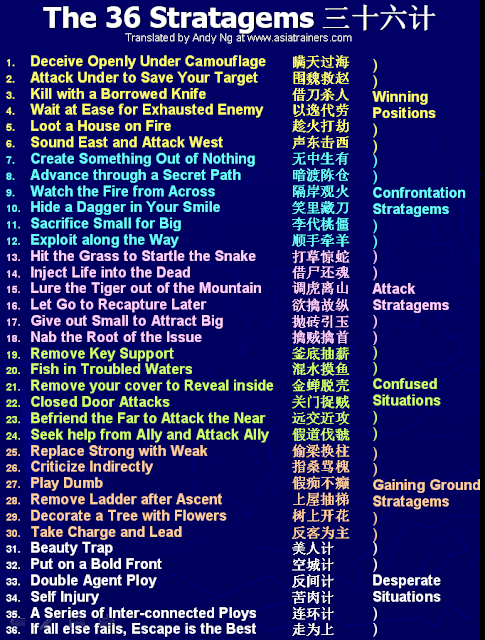Mention "36 Stratagems" 三十六计 and most people will say one of the following:
- Is this another name for the Art of War military classic 孙子兵法 written by Sun Tzu, a 484 BCE military strategist from China?
- Isn't this a very old book?
- This must be one of the chapters inside the Art of War book, right?
- This is Sun Tzu's second book
Of course none of the above is true. The 36 Stratagems is another book, with origins unknown, and no known authors as it was written by many people over several centuries. The last chapter "Escape is the Best" was first mentioned more than 1,000 years ago, but the form we know today is quite recent.
The current format that we know was only officially published in China (under the government's direction) in 1961. Thus in a way The 36 Stratagems is a relatively new book.
Today most scholars agree that the Thirty-Six Stratagems is likely a collection of idiomatic expressions taken from popular Chinese folklore, history, and myths. Sometime in the early Qing dynasty some enterprising editors collected them together and published them in the form that comes down to us today.
The Thirty-Six Stratagems is divided into a preface and six chapters containing six stratagems each. The first three chapters generally describe tactics for use in advantageous situations, whereas the last three chapters contain stratagems that are more suitable for disadvantageous situations. The 36 Stratagems is related to 36 battle scenarios in Chinese history and folklore, predominantly of the Warring States period and Three Kingdoms period of ancient China. Watch video at here
Although this book has less than 1,000 words, it contains wisdom that the Chinese believe can solve all of the world's problems. In my training, I welcome my participants to give me any problem in the world and I could on the spot, use one or a combination of the stratagems to solve the problems.
Some scholars think that although this book appears to be simple and short, it is actually harder to understand and apply than Sun Tzu's Art of War. In reality, out of The 36 Stratagems, 29 stratagems quoted Yi-Jing 易经 (or I-Ching), another ancient book written 3,000 years ago. In a way, The 36 Stratagems could be an extension of the Yi-Jing concepts.
All the 36 Stratagems are laid out in brief Chinese proverbs. To-date, no English translation can catch the real meaning of it, but I Andy Ng managed to do a modern translation. My translation is by means perfect, but it nevertheless explains the meaning and not just the word-by-word translation. Many of my students commented that my translation makes it easy to understand.
Please refer to the picture at the bottom of this article for the complete list of the 36 Stratagems and my English Translations. Note that the 36 stratagems are divided into 6 categories:
- Stratagems when you're in winning positions
- Stratagems for confrontation
- Stratagems for attack
- Stratagems in confused situations
- Stratagems to gain ground
- Stratagems in desperate situations
Before you find this too taxing, I simplify The 36 Stratagems into just 3 Stratagems:
- Stratagems of Ying Yang Balance: Stratagems number 5, 7, 11, 12, 14, 15, 18, 19, 20, 21, 23, 24, 25, 29, 30, 31, 33, 34 and 35
- Stratagems of Indirect and Gradual: Stratagems number 1, 2, 3, 6, 8, 10, 13, 17, 22, 26 and 28
- Stratagems of Wu Wei Inaction: Stratagems number 4, 9, 16, 27, 32 and 36
In other words, you can just remember that there are just 3 wisdom lessons of the Chinese and all the 36 stratagems fall under these 3 wisdom lessons:
- Ying Yang Balance: everything in this world is about a balance of the opposites Ying and Yang, with Ying being weak (or dark) and Yang being strong (or bright).
- Indirect and Gradual: the Chinese believe that it is wiser to be indirect than direct, and better to solve problems in a gradual manner than a drastic manner. In other words, everything is evolving and not be obvious and direct to most people
- Wu Wei Inaction: Inaction is about not taking action when conditions are not ready, inaction may appear to be no action but in reality, all the action is happening inside the mind. For example, when two persons quarrel, taking inaction may appear to be quiet or submissive, when in fact you are strategising and planning in your mind
But we at Asia Trainers go one step further. We help you apply the stratagems in your daily work, including people management and leadership, sales and customer service.
Today let's focus on People Management with The 36 Stratagems.
Generally, people management has 4 functions:
- Attracting talents
- Motivating and Inspiring people
- Resolving people issues
- Retaining talents
When we go through the 36 stratagems, our application will be on the above 4 functions. To know more about People Management with The 36 Stratagems, come for the world's first blended learning:
- Date: 18 August 2017 Friday
- Tiem: 12.45 pm to 3 pm
- Venue: Institute of Adult Learning, 11 Eunos Road 8, #05-03
- Fee: FREE as this is fully sponsored by the Insitute of Adult Learning, a unit of WDA
You need to bring your tablet or notebook for this course as this is a blended learning. To see details of this course and do a free registration, click here
Written by Andy Ng, Chief Trainer Coach at Asia Trainers www.asiatrainers.com


Comments
Post a Comment